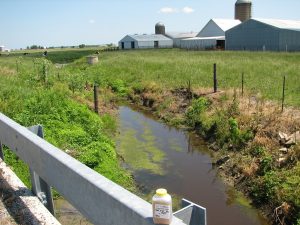
BY STACY JAMES
Prairie Rivers Network works with partners across the state to reduce water pollution from factory farms. Livestock waste pollutes Illinois’ water with disease-causing bacteria, antibiotics, ammonia, nitrates and algae blooms. In the most egregious cases, streams turn brown with raw sewage that kills all wildlife inhabitants. Pollution happens when waste storage structures leak or spill, a far too common occurrence that often goes undetected until there is a fish kill. Another way that streams become polluted is when too much manure is applied to farm fields as fertilizer and rain or melting snow carries the waste into nearby streams.
Factory farms are one of the least-regulated sources of pollution. Some regulations exist but they do not require adequately stringent manure management practices. State government is also underfunded to inspect factory farms and prevent problems from happening in the first place.
Consequently, we are seeking changes at the state level that would make a significant impact on Illinois’ rivers. We are focused on strengthening the rules that govern factory farms, and increasing the revenue available to the Illinois EPA for inspections. Fortunately, these efforts are proving fruitful, and we have made new allies along the way.
2 Steps Toward Cleaner Water
After two years of advocating for rule changes that would require more responsible livestock waste management, the Illinois EPA adopted several of our recommendations! The draft rules limit how much manure and liquid waste can be applied to farm fields. Applicators will be prohibited from applying waste close to ditches and other conduits that lead to streams. And the waste storage capacity requirements will be increased, so that overflows and untimely land application are less likely to occur.
While the draft rules look good, they must be approved by the Illinois Pollution Control Board. The Board will hold public hearings and accept public comments, and it is likely there will be stiff opposition from industry. We have serious concerns that industry action will water down the rules, and that the Board will be sympathetic to claims that stringent regulations are too expensive for factory farms.
Another key advancement we have been advocating for is pollution permit fees. This is a needed source of revenue to fund livestock permitting programs. All other water pollution permit applicants are required to pay a fee, and most of our neighboring states already charge permit fees to factory farms.
The good news is that the IEPA committed to us that they will run a fee bill in the General Assembly in 2012. After much pressure and a nearly-successful run in 2011 by our coalition of groups, the IEPA will run a bill even if there is Farm Bureau opposition.
Prairie Rivers Network saw the need for a permit fee bill a year ago and spent last spring working to get our bill passed. We had a number of supporters, but several legislators got cold feet because it was going to be a close vote and the Farm Bureau was lobbying hard against the bill.
In 2012, we will work to pass the permit fee bill and defend IEPA’s proposed livestock rule from industry attempts to remove positive reforms. We will be spending a lot of time in Springfield talking with legislators and attending IL Pollution Control Board hearings about the proposed rule.
How Can You Help?
There is much work yet to be done in order to achieve real and final improvements in Illinois’ livestock regulatory program. If you care about this issue and want to help us with lobbying or other activities, please contact Stacy at 217.344.2371 or sjames @ prairierivers.org.







